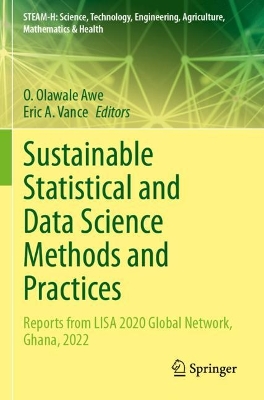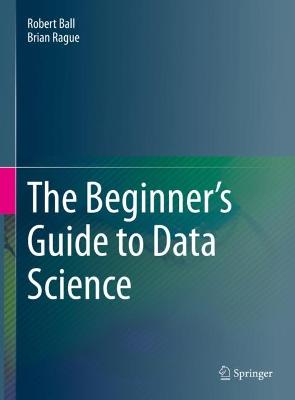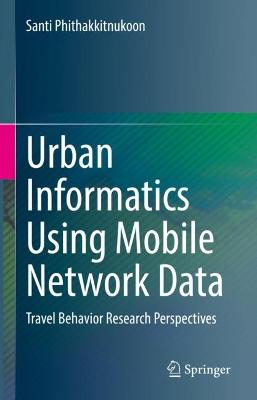Sustainable Statistical and Data Science Methods and Practices
 portes grátis
portes grátis
Sustainable Statistical and Data Science Methods and Practices
Reports from LISA 2020 Global Network, Ghana, 2022
Vance, Eric A.; Awe, O. Olawale
Springer International Publishing AG
01/2025
415
Mole
9783031413544
15 a 20 dias
Descrição não disponível.
Chapter. 1. Using social media and network services to promote statistical collaboration laboratories: A case study of LEA Brazil.- Chapter. 2. Renewable Energy Forecasting Using Deep Learning Models.- Chapter. 3. Exploring feature selection and supervised classification algorithms for predicting Obesity among rural women for policy decisions.- Chapter. 4. Re-examining Inflation and its drivers in Nigeria: A machine learning approach.- Chapter. 5. Estimating Relative Response Rates and Preferential Ranking of Subjects.- Chapter. 6. Wealth Creation and Poverty Alleviation in a Nigerian State: A Recent Evidence-Based Survey.- Chapter. 7. Effect of Statistics on Collaboration for Enhancing Institutional Sustainability: A Case of Mzumbe University-Tanzania.- Chapter. 8. Strategies for the Sustainability of Stat Labs: A Case Study of Laboratory of Interdisciplinary Statistical Analysis, Lahore College for Women University Lahore, Pakistan (LISA-LCWU).- Chapter. 9. Advanced Mathematics and Computations for Innovation and Sustainability of Modern Statistics Laboratory.- Chapter. 10. A New Estimator for the GPD Parameters under the POT Approach.- Chapter. 11. A simple yet Robust Estimation of binned data: Egypt Income distribution and Geographical Inequality.- Chapter. 12. Supervised Machine Learning Classification Algorithms: Some Applications and Code Snippets for Practical Implementations in Python Programming.- Chapter. 13. Exploring the spatial variability and different determinants of co-existence of under-nutritional status among children in India through a Bayesian geo-additive multinomial regression model.- Chapter. 14. Predicting the Nature of Terrorist Attacks in Nigeria Using Bayesian Neural Network Model.- Chapter. 15. Salvage Value from Deterioration (SVD): An Optimal Inventory Model for Chicken Egg Marketing.- Chapter. 16. Structural Equation Modeling with Stata: Illustration using a Population-Based, Nationally-Representative Dataset.- Chapter. 17. Time series forecasting of seasonal non-stationary climate data: A comparative study.- Chapter. 18. Weighted Hard and Soft Voting Ensemble Machine Learning CLASIFIERS: Application to Anaemia Diagnosis.- Chapter 19. Machine Learning Approaches for Handling Imbalances in Health Data Classification.- Chapter. 20. The Intersection of Data and Statistics with Sustainable Development Goals.- Chapter. 21. Teaching Data Science in Africa via Online Team-Based Learning.
Este título pertence ao(s) assunto(s) indicados(s). Para ver outros títulos clique no assunto desejado.
Conference Proceedings;Research;Applications;Statistical analysis;Statistics lab;LISA 2020;Data science education;Interdisciplinary statistical analysis;SDG;Data science;Statistics education
Chapter. 1. Using social media and network services to promote statistical collaboration laboratories: A case study of LEA Brazil.- Chapter. 2. Renewable Energy Forecasting Using Deep Learning Models.- Chapter. 3. Exploring feature selection and supervised classification algorithms for predicting Obesity among rural women for policy decisions.- Chapter. 4. Re-examining Inflation and its drivers in Nigeria: A machine learning approach.- Chapter. 5. Estimating Relative Response Rates and Preferential Ranking of Subjects.- Chapter. 6. Wealth Creation and Poverty Alleviation in a Nigerian State: A Recent Evidence-Based Survey.- Chapter. 7. Effect of Statistics on Collaboration for Enhancing Institutional Sustainability: A Case of Mzumbe University-Tanzania.- Chapter. 8. Strategies for the Sustainability of Stat Labs: A Case Study of Laboratory of Interdisciplinary Statistical Analysis, Lahore College for Women University Lahore, Pakistan (LISA-LCWU).- Chapter. 9. Advanced Mathematics and Computations for Innovation and Sustainability of Modern Statistics Laboratory.- Chapter. 10. A New Estimator for the GPD Parameters under the POT Approach.- Chapter. 11. A simple yet Robust Estimation of binned data: Egypt Income distribution and Geographical Inequality.- Chapter. 12. Supervised Machine Learning Classification Algorithms: Some Applications and Code Snippets for Practical Implementations in Python Programming.- Chapter. 13. Exploring the spatial variability and different determinants of co-existence of under-nutritional status among children in India through a Bayesian geo-additive multinomial regression model.- Chapter. 14. Predicting the Nature of Terrorist Attacks in Nigeria Using Bayesian Neural Network Model.- Chapter. 15. Salvage Value from Deterioration (SVD): An Optimal Inventory Model for Chicken Egg Marketing.- Chapter. 16. Structural Equation Modeling with Stata: Illustration using a Population-Based, Nationally-Representative Dataset.- Chapter. 17. Time series forecasting of seasonal non-stationary climate data: A comparative study.- Chapter. 18. Weighted Hard and Soft Voting Ensemble Machine Learning CLASIFIERS: Application to Anaemia Diagnosis.- Chapter 19. Machine Learning Approaches for Handling Imbalances in Health Data Classification.- Chapter. 20. The Intersection of Data and Statistics with Sustainable Development Goals.- Chapter. 21. Teaching Data Science in Africa via Online Team-Based Learning.
Este título pertence ao(s) assunto(s) indicados(s). Para ver outros títulos clique no assunto desejado.







